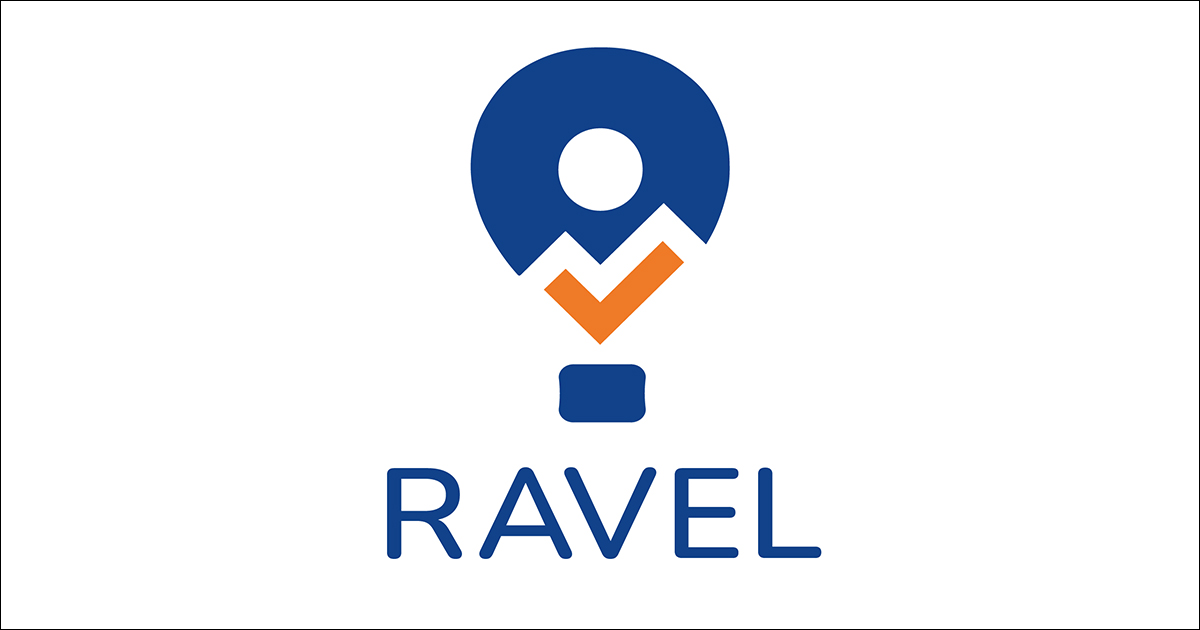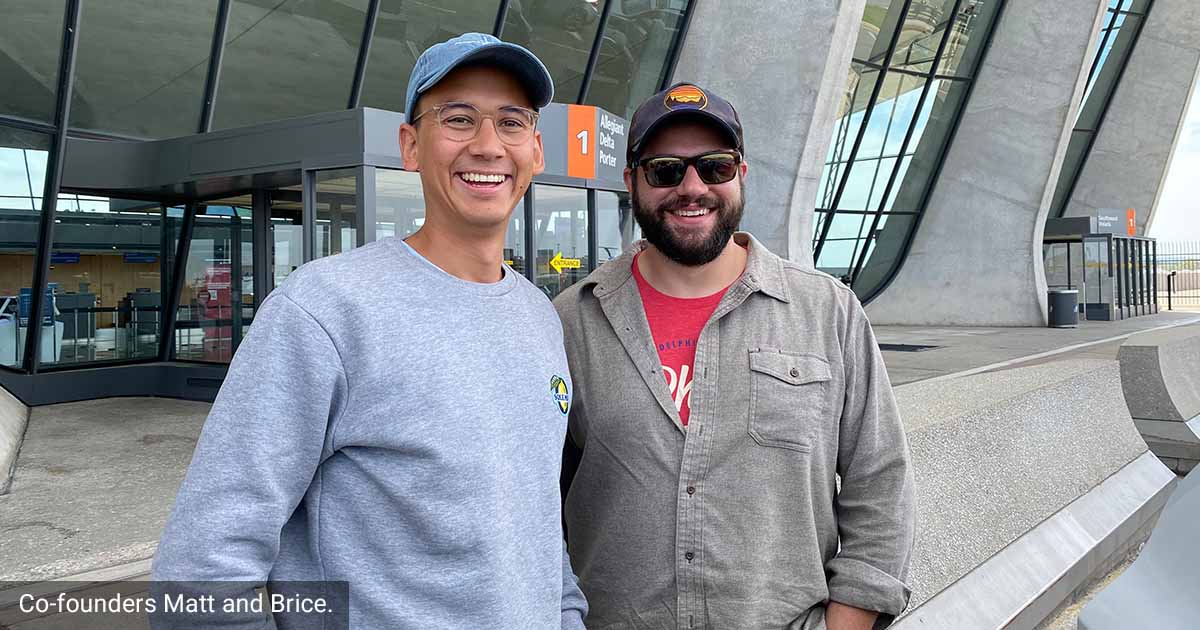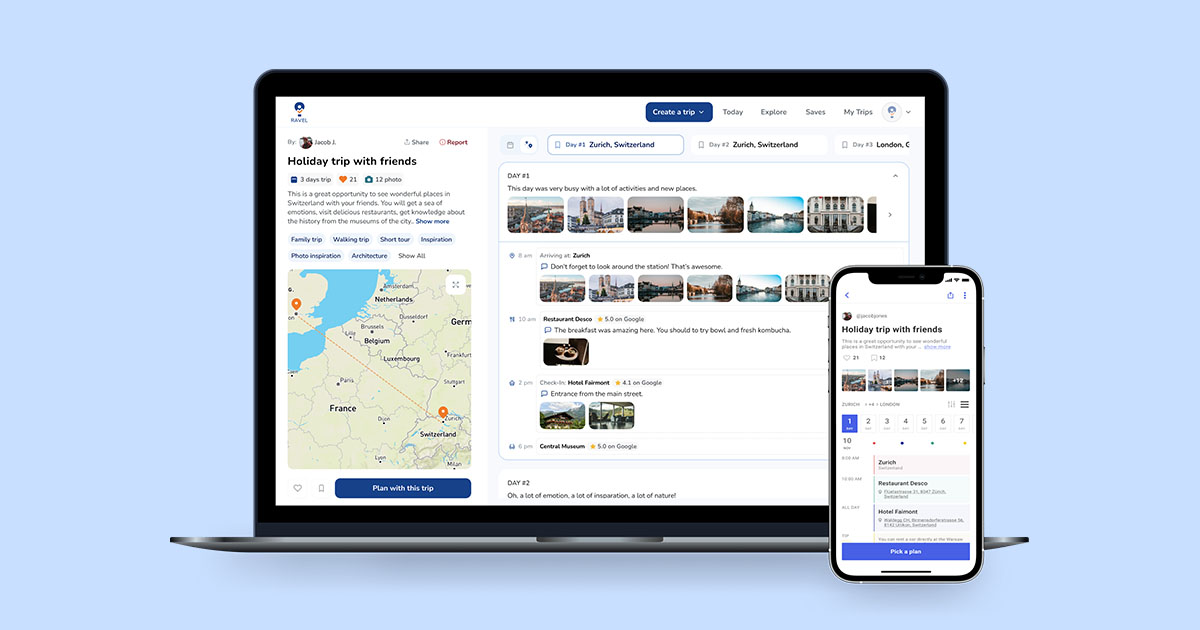Ravel Profile

Last Updated: By TRUiC Team
Ravel is a travel startup making trip planning quick and easy using their innovative trip planning tool and platform.
Interview With Brice Dreamer
Describe your product or service:
“The Ravel Trips platform is a collaborative trip planning tool and marketplace for travelers to match with local experts around the world to plan their next vacation for them.”
Describe your company values and mission:
“Our mission is to make bespoke personalized trips accessible to travelers around the world by bringing transparency into the planning process while helping small businesses grow. We value sustainable affordable travel options and building trust with equal opportunity for all stakeholders.”
How are you funded? I.e. type of funding, number of funding rounds, total funding amount.
“Friends and family with self-funding of $150,000.”
How big is your team? Tell us a little about them!
“The three founders come from diverse backgrounds in pharmaceuticals, financial services, and vehicle automation but we all share an absolute passion for traveling (80 countries visited and counting), so we have felt the pains when planning and booking trips. We're a remote team living in 6 countries. We have Ukrainian developers and designers on our team who have also felt the impact of forced travel. Additionally, we have two interns who have a drive to see the world and learn about a growing business in a rapidly changing industry.”
How did you come up with and validate your startup idea? Tell us the story!
“While planning a 30-day road trip in Australia, Brice looked for a platform to help him craft a customized trip plan. Reading blogs, guide books, and websites just didn't provide him what he needed. At first, the idea was to solve this by building a trip planning tool and social platform where travelers could share and reuse trips to save planning time. However, it turned out that businesses like travel agencies were the ones most interested in creating the content and gaining clients on a platform like this. After testing a trip planning service with some initial customers, we began to bring on travel agency partners and connect them together. And that's where our marketplace began to take shape!”
How did you come up with your startup's name? Did you have other names you considered?
“The idea was to make it very simple to plan trips for yourself — to unravel the complexity of travel and make it easy to understand, replicate, and adapt to your needs. ‘Unravel’ and ‘ravel’ are, in fact, synonyms, and it happens that ‘travel’ without a T is ‘Ravel’ … so we chose this name.”
Did you always want to start your own business? What made you want to become an entrepreneur?
“I always had a dream of starting my own business. I have tried quite a few projects over the past decade with not many of them taking off, but it all came down to the right circumstances and finding the right team to surround myself with, who had the same vision as me.”
Did you encounter any roadblocks when launching your startup? If so, what were they and what did you do to solve them?
“As mentioned in our validation of the product, we found we had been targeting the wrong customer and therefore made a pivot about one year ago. This was also during covid lockdown which meant that no one was traveling and therefore it was impossible to convince people to think about traveling or create content from past trips. This presented an opportunity however for businesses to get their name out there and show what they are capable of creating for clients. Also in building our product in the early days, we didn't have a technical co-founder, but also we didn't have much money to invest to build a product. So we had to really take things step by step — designing, prototyping, convincing some investors, building a basic MVP, pivoting, getting initial clients, reinvesting, and finally building our platform.”
Feeling inspired? Learn how to launch your company with our guide on how to start a startup.
Who is your target market? How did you establish the right market for your startup?
“As we are a two-sided marketplace, we have two main customers. On the supplier side, we target small- and medium-sized travel businesses that plan and book trips for customers (agencies, DMCs, tour operators, single agents). On the demand side, we currently target Gen Y and millennials planning complicated vacations.
It took some time to find the right fit for both sides however through discussions with customers and testing through ads, we were able to determine the best markets. We've also happily found some specific areas for which our platform works really well — for example, honeymoons.”
What's your primary marketing strategy?
“We drive visitors to our website through content marketing like blogs, and we do targeted ads for some locations who have decent content and advisors for.”
How did you acquire your first 100 customers?
“At launch, we targeted getting advisors for specific regions and then marketed those regions to customers. This way we could show enough content and be sure we could provide services. Interestingly, 50% of our new business is through referrals.”
What are the key customer metrics / unit economics / KPIs you pay attention to to monitor the health of your business?
“Trip request to conversion ratio, monthly active users, CAC, total trip value, and planning value.”
What's your favorite startup book and podcast?
“Book: ‘Zero to One’ by Peter Thiel.
Podcast: ‘Traction’ with Lloyed Lobo.”
What is a song or artist that you listen to for motivation?
“Vampire Weekend.”
Is there a tool, app, or resource that you swear by to help run your startup?
“Slack.”
What is something that surprised you about entrepreneurship?
“How things go either incredibly fast or incredibly slow (or at least it feels like one of the two all the time)”
How do you achieve work/life balance as a founder?
“Since my team is spread out through many time zones, we have morning and evening meetings. I try to block times for working and times for other things like family. It's really difficult, but I've learned to make a weekly routine where some days are focused on Product for example while other days are for Sales and other days are only for family.”
What is a strategy you use to stay productive and focused?
“I try to schedule work on my calendar and try to stick to the time. This keeps me from either getting bored of a topic or diving too deep and getting lost. In general, I try to take an 80/20 approach to getting things done. Nothing will be perfect, and many things will change anyway, so if it's in the right direction then it's already a great first step.”
When did you know it was time to quit your day job to focus on your startup?
“When we got our first clients with reasonably sized contracts, I was spending too much time working and less time with my family. I knew I needed to let one of the three go and I chose my day job. Of course, life isn't as financially comfortable yet, but I certainly have a better work/life balance.”
What was your first job and what did it teach you?
“After college, I became a production engineer in a manufacturing plant where we packaged pharmaceutical products. During that time I realized that you can learn and grow so much if you just put in the hard work. It's not about how smart or successful you are until that point — you need to put in the time and learn from the people around you.”
Recommended:
- Keep up with more startup companies by visiting our list of the top startups to watch.
- Hear startup stories from real founders on the Startup Savants podcast.
- Form your own startup by reading our review of the best online incorporation services.
Tell Us Your Startup Story
Are you a startup founder and want to share your entrepreneurial journey withh our readers? Click below to contact us today!
More on Ravel

Founder of Travel Startup Ravel Shares Their Top Insights
Brice Dreamer, founder of travel startup Ravel, shared valuable insights during our interview that will inspire and motivate aspiring entrepreneurs.

Here’s How You Can Support Travel Startup Ravel
We asked Brice Dreamer, founder of Ravel, to share the most impactful ways to support their startup, and this is what they had to say.


